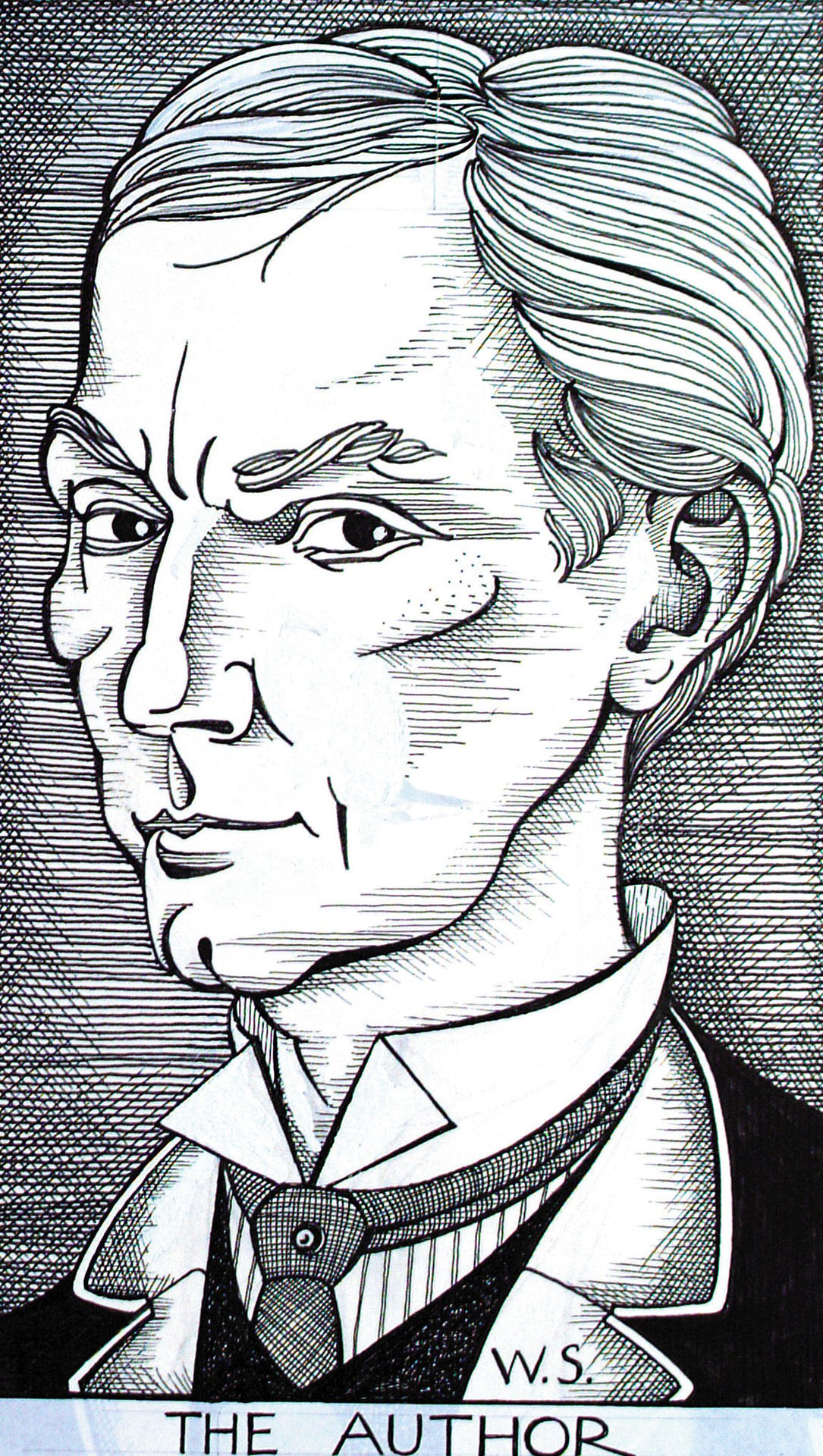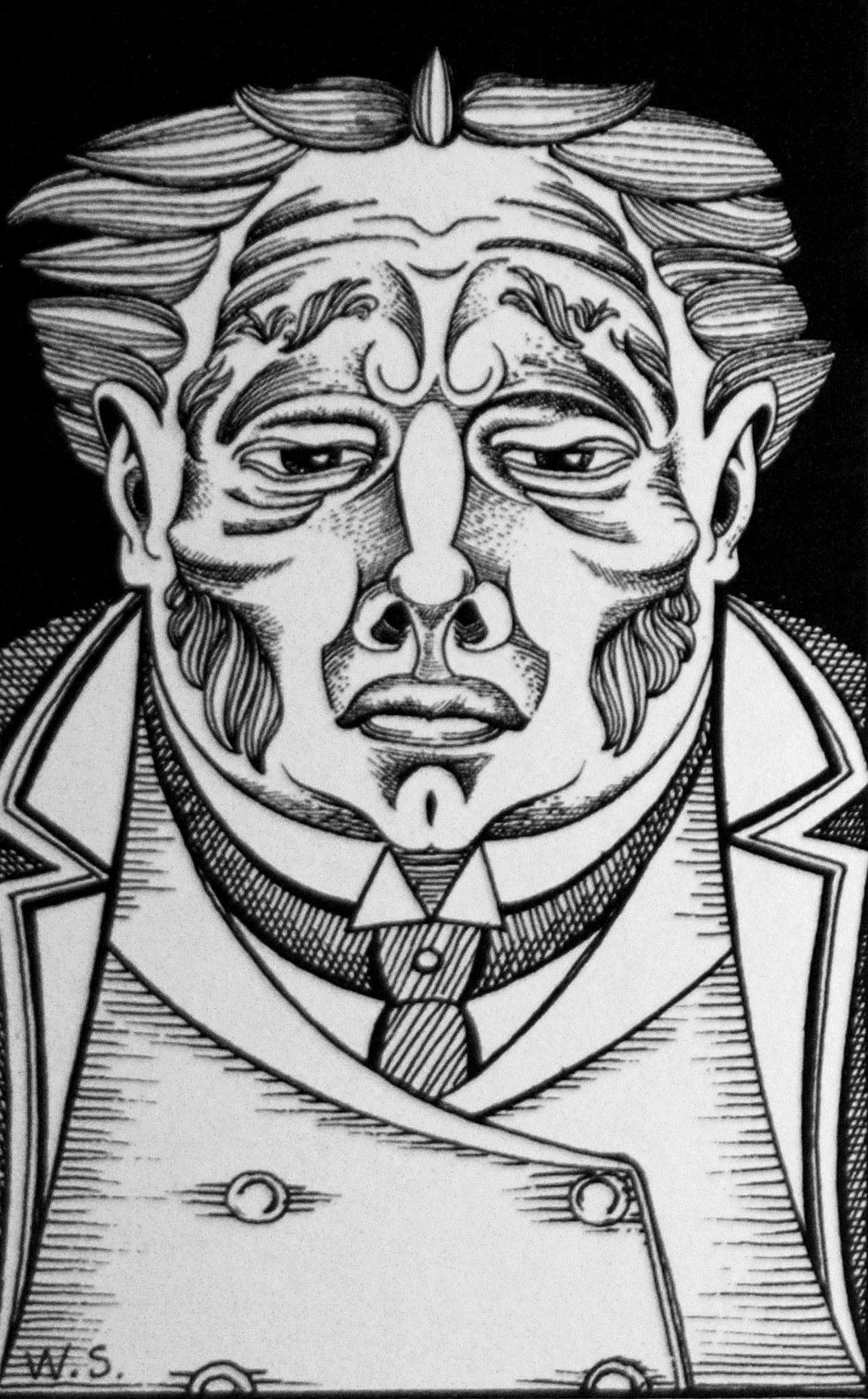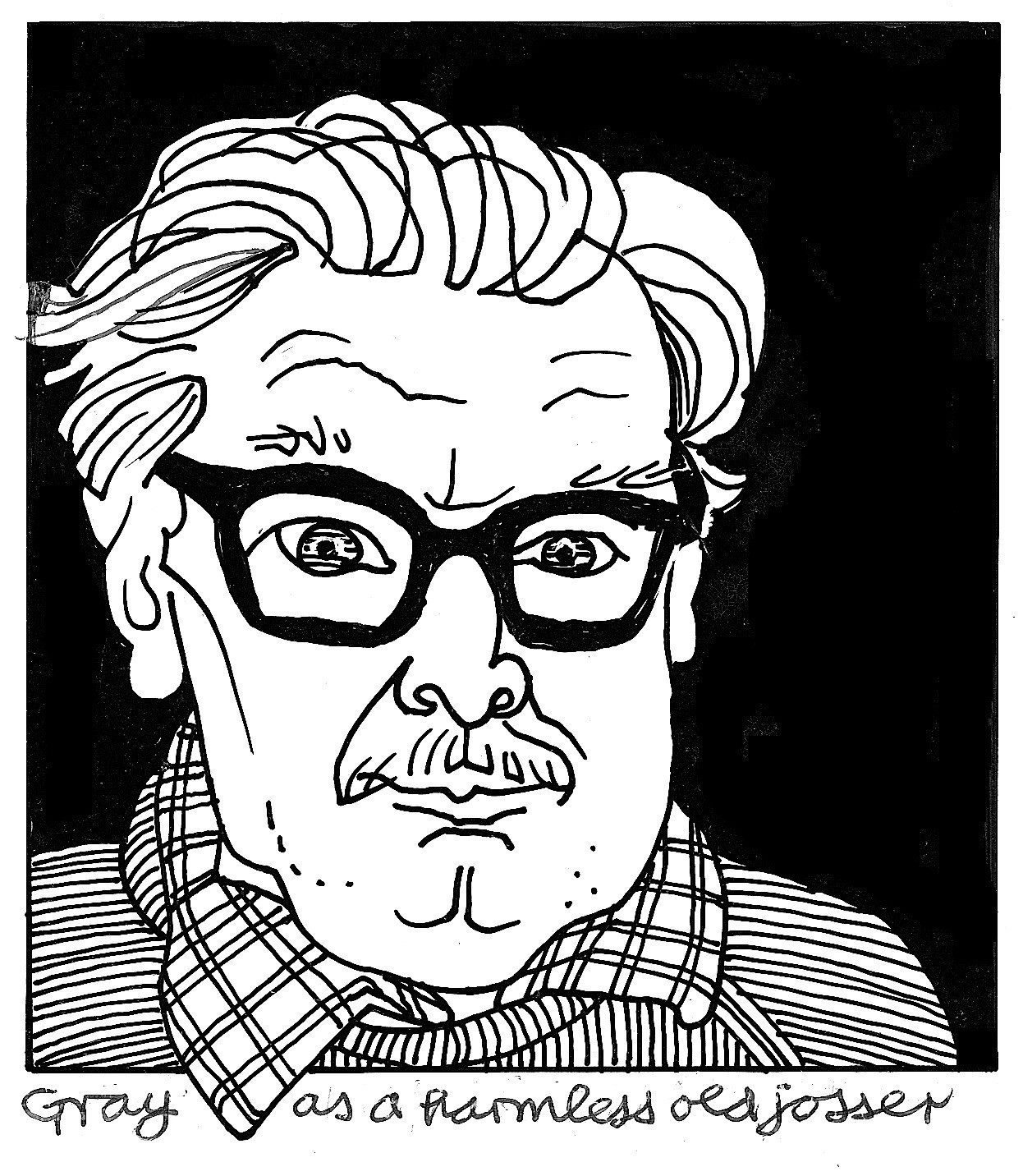Archibald McCandless

Portrait of Archibald McCandless from Poor Things (1992) illustration, courtesy AGA
Archibald McCandless is the primary narrator of this Victorian tale, who documents “all that was morbid in that most morbid of centuries” (p.272). Born in Whauphill, Galloway in 1862, McCandless is a poor but dedicated medical student at the University of Glasgow. He befriends the monstrous-looking medical genius, Godwin Baxter, and through this friendship meets Godwin’s ‘creation’, Bella Baxter. What follows is McCandless’s account of his relationship with both characters which he records in his memoir, Episodes from the Early Life of a Scottish Public Health Officer. After the memoir ends, we learn from Archie's wife Victoria, that the book we’ve just read might be full of lies. In McCandless' account of his life, he depicts himself as head over heels for Bella. (Some may say obsessed.) He would do anything to be with her, to be her ‘candle’ - her nickname for him. McCandless is your typical ‘nice guy’. A meek, somewhat gentle man, he never accepts guilt for his compliance and involvement in Bella’s subjugation. Whether or not you view Bella as a downtrodden heroine or a strong feminist icon, the men around her like McCandless, frequently shun her sexuality, diminish her thoughts and try to silence her words. He sits back, watches the action unfold, then pleads with Bella that he will be a great husband to her, allowing her to practice medicine and have her freedom. Ha Ha, we are not tricked! We’ve seen your kind before, McCandless! Archie uses his accounts to manipulate the reader into believing his side, rather than Bella’s. So, don’t be tricked! This is one only interpretation of Archibald McCandless, of course … it’s up to you to decide who the real Archie truly is.
Written by Grace Richardson
Character Description: Archibald McCandless
Who is Archie McCandless?
By Rodge Glass
WHO IS ARCHIE MCCANDLESS? Well, it depends on who’s asking. Why they’re asking. What they know, or what they think they do. As with so many elements of Alasdair Gray’s multi-directional novel Poor Things, some parts of this key character’s story are up for debate. Certainly, the central idea in the book – that in 19th Century Glasgow, a woman was brought back to life by Godwin Baxter, who inserted the brain of an unborn baby into a 25-year-old woman’s head after she’d committed suicide – is not exactly reliable information, though Archie McCandless swears it is true. After all, he claims he married that woman, Bella Baxter, and that she made his ‘life worth living’. Doubt is central to Poor Things, and many of Archie’s claims are upended by the final section of the novel, written by one Victoria McCandless, who labels her husband’s publication a mere fantasy. At no point in Poor Things is a definitive version of events given. Readers must navigate the contradictory sections of the book and decide which they want to believe. That said, it is possible, through the various perspectives offered in Gray’s novel, to parse what we know from what we think we know – and what might be pure speculation. And certain facts are undisputed. So, who is Archie McCandless? Let’s give it a go.
The first part of Archie’s life is easy to mark out. As reported in the earliest chapters of his self-published, catchily-titled ‘Episodes from the Early Life of a Scottish Public Health Officer’, he is born to a poor family of farm workers in Galloway, southern Scotland. His mother distrusts banks, so she keeps her lifesavings in a tin trunk kept under her own bed. In this trunk, which he is given on his mother’s deathbed, there is enough for young Archie to go to university in Glasgow, to study to become a doctor. Just about. That is, enough to get him in the door – though not enough to disguise his origins. Which marks him out from his fellow students.
To hear Archie introduce himself in what is (supposedly) the first chapter of his self-published memoirs 'Episodes from the Early Life of a Scottish Public Health Officer', click the play bar below.
Poor Things (1992) illustration; Poor Things by Alasdair Gray, reader: Jimmy Chisholm, s1 Parts 1&2 / s2 Parts 3&4 / cassette label: 'STORYLINE: POOR THINGS', Acc. 13416/74, National Library of Scotland, digitized by the 'Collections on Tape' team at Glasgow Museums

As reported in the novel's first chapter, ‘Making Me’, McCandless finds himself summoned to a meeting at the end of a university term with a Professor who confesses that, ‘in a just world, I could predict a brilliant future for you, but not in this one, unless you make some changes.’ (Poor Things, 10). In a typically Gray-esque set-up, Archie is presented as having a choice, though really he has none at all, because of his social class. The Professor goes on to give precise advice over how Archie should carry himself, how to treat his clothes, how to achieve a ‘polite appearance’, in order to get ahead. He thinks he is being kind. When Archie explains he can’t afford to follow the advice, as he must prioritise his ‘fees, books, instruments and keep’, the Professor is appalled, and recommends at least finding the money for the price of a suit, as a first move. This is done in such a superior, pompous way that Archie cannot accept. He can no more shed his Galloway pride than he can shed his personality. Archie’s counter proposal is that the Professor lend him money he pay back at interest, on his predicted success. But of course, the Professor will not put himself out to help. Archie must carry on with his studies, barely able to scrape by – and certainly not able to fit in.
The other notable outsider in the class is a man called Godwin Baxter, who will soon become a transformative figure in Archie’s life. Where he is awkward, plain, unremarkable, though a hard worker, Godwin is the radical, inspiring, infamous son of ‘Sir Colin’, who was known for remarkable medical breakthroughs in his day. For a brief time, Godwin, also a surgeon, and Archie are thrust together, and Godwin takes Archie into his trust over a key discovery he claims to have made. At this point, Archie’s life takes a path that his wife, many years later, will insist is imagined.

Portrait of Godwin Baxter from Poor Things (1992) illustration, courtesy AGA
What follows is the main narrative told in Archie’s ‘Episodes from the Early Life…’, and much of that is disputed – making it harder to talk about in plain terms here. Other sections of this site explain in much more detail who Bella Baxter is, also what role Godwin takes in trying to ‘educate’ this young woman who is determined to discover the world for herself, as she sees fit, rather than be ushered here and there by the men aiming to control her. If we know anything at all about the character known as ‘Bella’, it’s that she resists expectations. But purely from Archie’s perspective, his claim is simple.
In ‘Episodes from the Early Life…’, Archie claims that Bella, once brought back to life by Godwin, races through the various stages of childhood and maturity at a magical pace. Soon she agrees to marry him, her ‘Candle’ as she calls him, before she elopes and disappears off around the world with a solicitor called Duncan Wedderburn. In this act, she sees no betrayal, and she continues to write to her betrothed Candle from her various travels, complaining of the effects of Wedderburn’s exhaustion due to his obsession with ‘wedding’ (sex). On her return, her wedding with McCandless is arranged, with a very small guest list, in a West End of Glasgow church. Then comes the big set piece of the book. Waiting for the bride and groom in the church are the family – including the alleged husband of Bella – General Sir Aubrey de la Pole Blessington. They claim that Bella is in fact Lady Victoria Blessington, the General’s wife, who disappeared several years before. (Yes, more men claiming to have access to her true identity. Yes, claim and counter-claim.) They try to persuade her to return to the General – all while McCandless stands unable to influence events, or barely to understand them, though all this takes place as part of a chapter titled ‘The Truth’. Asserting that a life without freedom is ‘not worth living at all’, Bella chooses to marry her Candle after all. There are further complications, confessions, and there’s much to wonder about. But once again, from McCandless’s perspective, the most important thing is: they life happily ever after, in a world in which Bella goes on to have a hugely distinguished medical career of her own. All this in an era when such a thing was almost impossible for any woman. Truly, he makes her a heroine, though one defined by and dedicated to, him.

Poor Things (1992) illustration, courtesy AGA
The final section of Poor Things (arranged, in a particular order of course, by one Alasdair Gray), is presented as the text of a letter from Victoria McCandless MD, to be read by her eldest surviving descendent, in the year 1974. In it, she debunks almost everything about Archie’s version of events. (Even the title she sneers at, pointing out that her husband was only a Public Health Officer for less than a year.) Throughout her letter, Victoria paints her husband as a pathetic figure. Though she commends him for spending more time with their children than she did, and she notes he was certainly devoted to her, she reports this in a way that makes her condescension clear. She’s also irritated by the text of his self-published ‘memoir’, which she thinks a fantastical indulgence, and further evidence of his poor judgement. Noting the printing costs, she describes this as ‘enough to feed, clothe and educate twelve orphans for a year’ (Poor Things, 251). McCandless is painted as an utterly unremarkable, totally forgettable figure – even in trying to write about her husband, Victoria finds him so dull that she drifts into discussing her children instead. But she drifts back, whereby she takes apart Archie’s claims one by one, replacing them with the facts as she believes them indisputably to be. Cold, hard facts from a world in which magic is replaced with the mundane. She also charges her husband with ripping off multiple other books of the period – further evidence, she claims, of just how deluded, lost and in thrall to others this man truly was. Victoria is presented here as a moral giant, a woman of principle, an outcast in her own society for her ideas, which were then considered too radical, but might now be widely thought of as ahead of her time. In among the many claims of her letter, which ranges across politics, war and women’s health and rights, Victoria calls Godwin Baxter ‘the only man I have truly loved’ (Poor Things, 259). Had Archie read the letter intended for their descendants, he’d surely have been crushed by that line.
So what to believe?
So much of the structure, delivery and tone of Poor Things invites readers to believe in the impossible. The very fact that Archie’s narrative comes before Victoria McCandless’s account – relegated to the back – encourages readers to trust Archie’s version of events, as he tells them. And yet, she gets the last word. Gray the supposed Editor, who writes the Introduction, also seems to believe Archie’s version of events, and that plays a part too, in how readers are encouraged to view the events of Archie’s life. Was he a deluded romantic who invented the story of ‘Bella Baxter’ to entertain himself, self-published in his book that ‘stinks of Victorianism’? Or did it all really happen? Gray, as ever, leaves the trifling detail of ‘the truth’ in the hands of his readers. Meanwhile, you’re entertained – and then some – by Archie, and those who surround him.
Character Prompts

